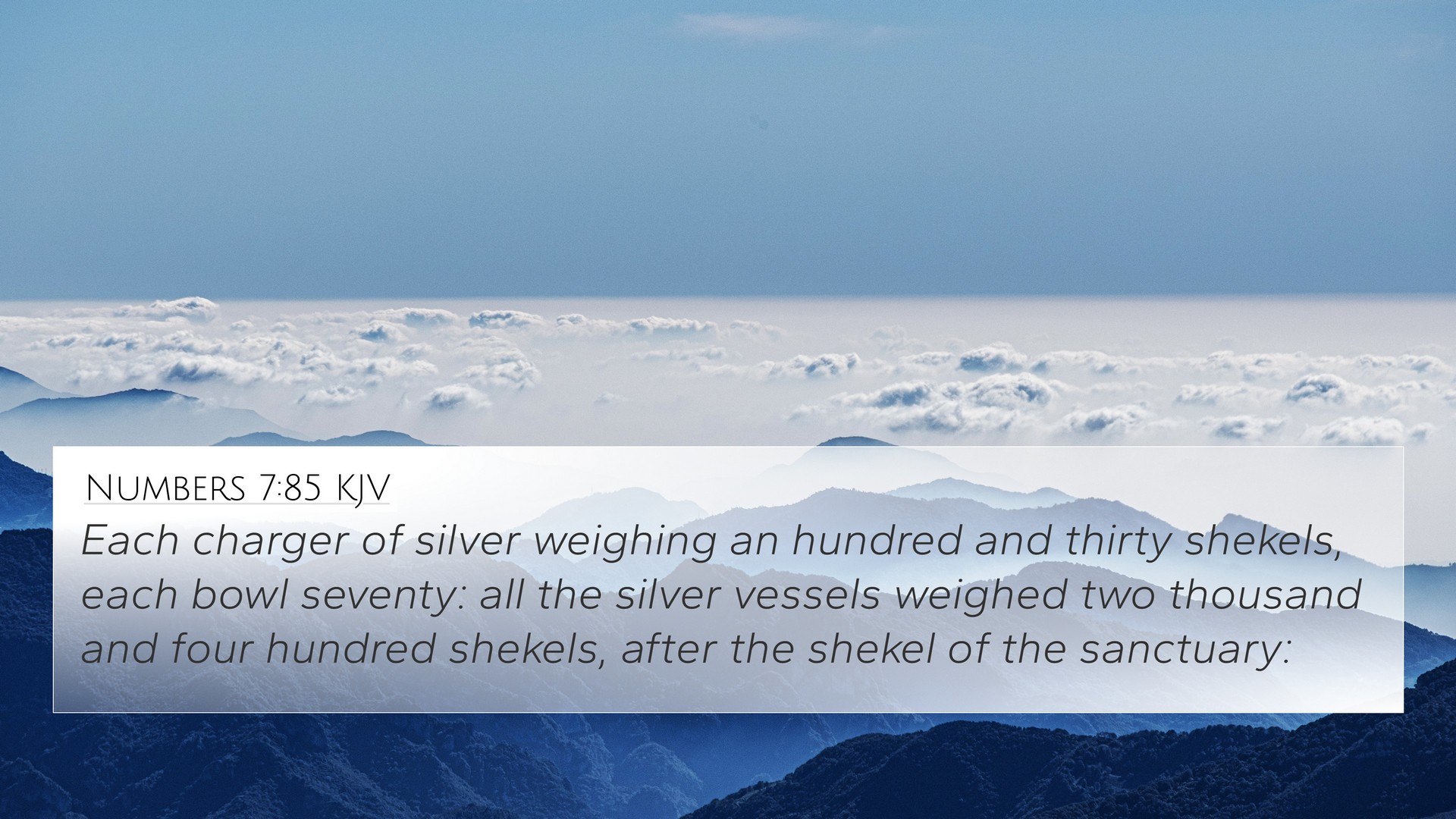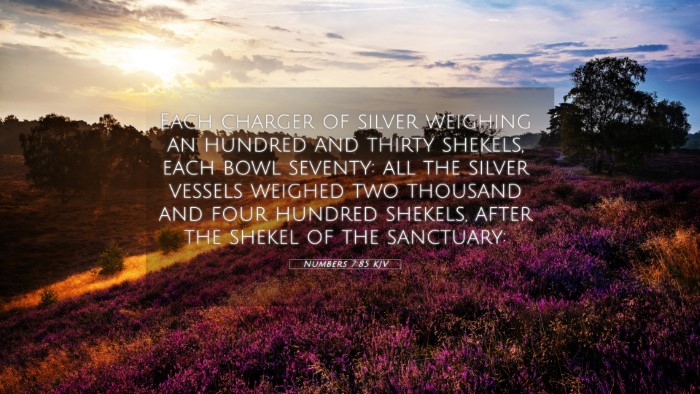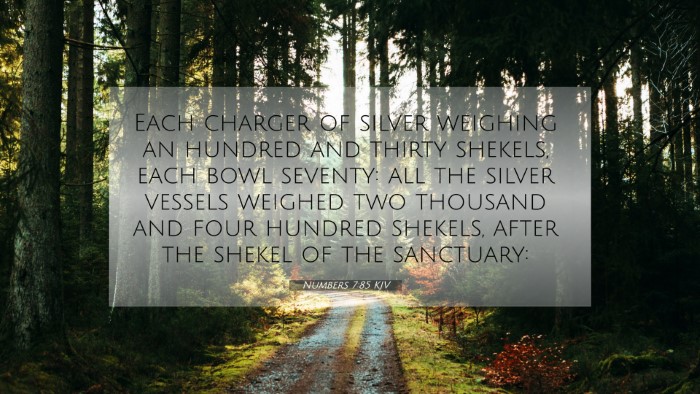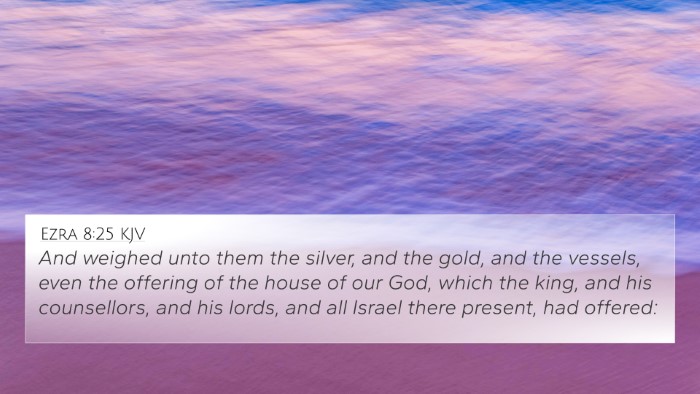Meaning and Interpretation of Numbers 7:85
Verse Text: "Each bowl of gold was ten shekels, full of incense: so all the golden bowls were ten shekels, after the shekel of the sanctuary: and all the silver basons weighed two hundred shekels, after the shekel of the sanctuary: the total of all the vessels of gold and silver was twelve hundred shekels, after the shekel of the sanctuary."
Summary of Interpretation
The passage in Numbers 7:85 provides a detailed enumeration of the offerings made by the leaders of the tribes of Israel during the dedication of the altar. This verse emphasizes the aspect of reverence and meticulousness in giving to God, as the weights and values are carefully recorded to show the significance of the items given.
According to Matthew Henry, the specifics in the weight and material signify the elevated status of worship due to God. Each item’s weight, whether gold or silver, reflects the generosity expected in worship and the acknowledgment of God’s sovereignty.
Albert Barnes notes that these contributions were essential not only for worship but also symbolically represent the collective offering from each tribe, highlighting their individual contributions to the community of faith. The gold and silver also underscore the richness of God's provisions and the faithful response of His people.
Adam Clarke points out that this meticulous accounting serves as a reminder of the importance of stewardship in worship. It teaches the necessity for worshippers to ensure that their offerings to God reflect their gratitude and dedication to Him, showcasing a theme of authenticity in worship.
Related Bible Cross-References
- Exodus 25:3-7 - Details the materials needed for the construction of the tabernacle.
- 1 Chronicles 29:3-5 - David's offering to the temple and his emphasis on giving with a willing heart.
- Matthew 5:23-24 - The necessity of offering before coming to reconciliation, underscoring the importance of sincere offerings.
- Hebrews 13:16 - Encourages believers to do good and share, as these are sacrifices pleasing to God.
- Malachi 1:14 - Discusses the importance of offering to God that which is precious and valuable.
- 2 Corinthians 9:7 - Advises believers to give what they have decided in their heart, for God loves a cheerful giver.
- Philippians 4:18 - Paul speaks of the gifts of the Philippians as a fragrant offering, acceptable to God.
Thematic Connections and Analysis
This verse ties into larger biblical themes of worship, sacrifice, and community contribution. These themes resonate throughout both the Old and New Testaments, linking various passages that address the heart of giving and worship.
The Connections between Bible verses demonstrate a continued call for faithful worship through offerings. It's evident that both the act of giving and the quality of the offering hold significant spiritual value across scriptural narratives.
Comparative Bible verse analysis reveals how offerings symbolize more than mere transactions; they represent the worshipper’s attitude and acknowledgment of God’s providential role in their lives.
Engaging in Cross-referencing Biblical texts enhances our understanding of how the particulars of worship (like those detailed in Numbers 7:85) relate back to God’s expectations as laid out throughout the Bible.
The Thematic Bible verse connections from this text can encourage a deeper look into how individual contributions matter within the community of faith, reinforcing the message found in Romans 12:1 about being living sacrifices.
Tools and Methods for Bible Cross-Referencing
Utilizing a Bible concordance is one effective method for finding related scriptures. This tool allows readers to trace themes and words across the Bible to uncover connections and deepen understanding.
A cross-reference Bible study guide can help in identifying significant links between passages, thereby enhancing the user’s study and interpretation of scripture.
To effectively engage with the Bible cross-reference system, one can explore themes present in both the Old and New Testaments that highlight God's unchanging nature and expectations for worship.
Conclusion
Numbers 7:85 serves as more than a record of offerings; it provides insight into the communal and individual acts of worship in ancient Israel. By examining this verse, and linking it with other significant biblical texts, believers can gain a deeper understanding of what it means to offer to God genuinely and generously.
This exploration showcases how understanding the Bible requires *inter-Biblical dialogue* and looking at wise interpretations from historical commentaries alongside a methodical approach to Bible verses that relate to each other.






